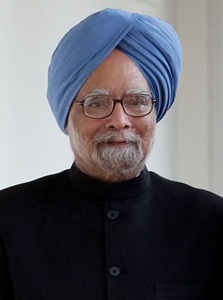A day after finance minister Nirmala Sitaraman squarely blamed former prime minister and finance minister Manmohan Singh and the then RBI governor Raghuram Rajan for the financial woes of the country’s state-run banks, Manmohan Singh hit back saying the NDA government should end the blame game and look for ways to fix the economy.

He said the government "is obsessed with trying to fix blame on its opponents" instead of finding solutions, which it is incapable of.
The former prime minister also referred to the Punjab and Maharashtra Co-operative (PMC) bank crisis, which has impacted 16 lakh investors, and said the BJP governments at the centre and Maharashtra were unwilling to adopt people-friendly policies.
"I have just seen the statements by finance minister Nirmala Sitharaman. I won't like to comment on that statement, but before one can fix the economy, one needs a correct diagnosis of its ailments and their causes. The government is obsessed with trying to fix blame on its opponent, thus it is unable to find a solution that will ensure revival of the economy," Manmohan Singh said at a press conference in Mumbai in the run-up to the Maharashtra election on Monday.
"When I was in office what happened did happen. There were some weaknesses. But you can't claim that the fault lies with the UPA always. You have been in office for five years. Mainly passing buck to UPA is not enough," said Singh, who was prime minister of India from 2004 to 2014.
On Tuesday, Nirmala Sitharaman had, at an event in the US, said she held the Manmohan Singh-Raghuram Rajan combination responsible for subjecting public sector banks to their "worst phase".
Finance Minister Nirmala Sitharaman has blamed Manmohan Singh and Raghuram Rajan of creating stress in public sector banks
"I have no reason to doubt that Rajan feels for every word of what he is saying. And I'm here today, giving him his due respect, but also placing the fact before you that Indian public sector banks did not have a worst phase than when the combination of Singh and Rajan, as Prime Minister and the Governor of the Reserve Bank of India (RBI), had. At that time, none of us knew about it," the Finance Minister had said at Columbia University's School of International and Public Affairs in New York.
She said it was during Rajan's stint as RBI chief that loans were given just based on phone calls from crony leaders. "Singh was the Prime Minister and I'm sure Rajan will agree that Singh would have had a consistent articulated vision for India," Sitharaman said, drawing chuckles from her audience.
Both Manmohan Singh and Raghuram Rajan have been fierce critics of the NDA government’s economic policies, including the overnight notes ban in November 2016 that they say broke the back of the cash-dependent informal economy.
Sitharaman has announced a slew of measures, including a big reduction in corporate tax rates and measures to boost consumer spending, at the risk of widening India's fiscal deficit, in a bid to pump-prime the economy.
"...I do respect Raghuram Rajan as a great scholar who chose to be in the central bank in India at a time when the Indian economy was all buoyant," Sitharaman said at the lecture at the university in New York City, organised by the Deepak and Neera Raj Centre on Indian Economic Policies.
Sitharaman was responding to a question from the audience about Raghuram Rajan's recent comment seen to be directed at PM Modi that only "internal cohesion and economic growth" and not "majoritarianism" will help strengthen India's national security. "In the long run, it seems to me that internal cohesion and economic growth rather than divisive, populist majoritarianism will be India's root to national security. So all this sort of majoritarianism may certainly for a while win elections, but it is taking India down a dark and uncertain path," Rajan said at the OP Jindal lecture at Watson Institute, Brown University, on 9 October.
"It was in Rajan's time as governor of the Reserve Bank that loans were given just based on phone calls from crony leaders, and public sector banks in India till today are depending on the government's equity infusion to get out of that mire," she said.
"Dr Singh was the Prime Minister and I'm sure Dr Rajan will agree that Dr Singh would have had a consistent articulated vision for India," the finance minister said, adding, however, that she wants to thank the former RBI governor for ordering an asset quality review of PSBs.
To a question whether leadership has been centralised now, Sitharaman said, "I'd like to say that very democratised leadership led to a whole lot of corruption. Very democratised leadership. The prime minister, after all is the first among equals in any cabinet... You need to have a country as diverse as India with an effective leadership. A rather too democratic leadership, which probably will have the approval of quite a lot of liberals, I'm afraid, left behind such a nasty stink of corruption, which we are cleaning up even today," she added.



















